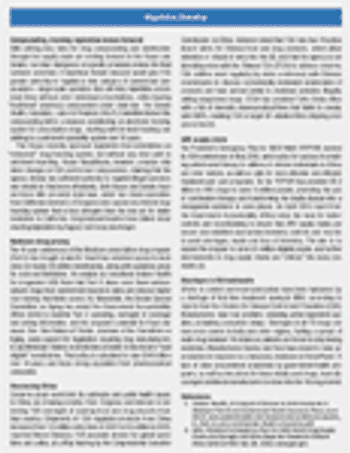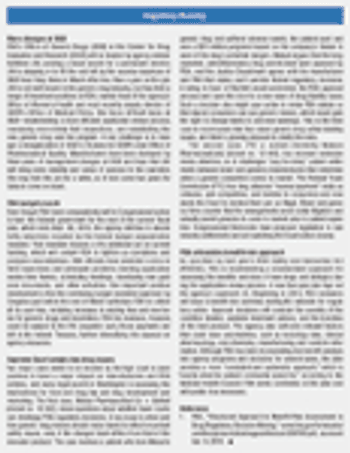
EMA releases concept paper on development of product-specific guidance on demonstration of bioequivalence.

EMA releases concept paper on development of product-specific guidance on demonstration of bioequivalence.

FDA funds research to further development of innovative generics, while working to address review and approval issues.

Falsified Medicines Directive requires imported APIs to have written confirmation of GMP standards.

Europe prepares for inclusion of Croatia in EMA activities.

Programs assist in the fast track of drugs for serious conditions.

European governments are under pressure to take regulatory action, but solving the problem of medicine shortages is not as straightforward as it seems.

Increased manufacturer outsourcing requires clear policies and written agreements with CMOs.

The EMA's Committee for Medicinal Products for Human Use has recommended granting of marketing authorizations for the first two monoclonal antibody biosimilars.

EMA?s revised guideline on biosimilars containing biotechnology-derived proteins is published for public consultation.

USP appoints regulatory experts to elemental impurities implementation advisory group.

FDA cites cGMP violations of finished pharmaceuticals at the company's facilities in Marion North Carolina and Jayuya, Puerto Rico.

FDA Discovers Microbial Contamination in Compound Pharmacy Products

The company is cited for using unapproved visual-inspection methods for finished parenteral drugs and conducting inadequate visual inspections.

Modular containment room at Belfast facility allows studies of biologics and vaccines.

Bills to regulate drug compounding and establish a national track and trace system face political and policy differences.

A science- and risk-based approach to verify and demonstrate that a process operating within predefined specified parameters consistently produces material that meets all its critical quality attributes.

Ranbaxy's $500 million settlement for producing adulterated drugs and fradulent data provides a cautionary tale for patients, FDA, and drug manufacturers.

A unique demographic and payer mix make ASEAN an increasingly attractive region.

Companies can use metrics as a tool to help drive positive change and quality process improvements.

FDA addresses shortages of drugs needed to treat premature infants and patients unable to eat or drink by mouth.

Company receives notice from FDA for not fully investigating foreign particles in APIs and finished products from its facility in Ingelheim am Rhein, Germany.

FDA has released guidance on best practices for conducting and reporting pharmacoepidemiologic safety studies.

EMA clarifies biosimilars guidelines.

Manufacturers work with international authorities to harmonize drug registration and supply-chain oversight.

FDA issues draft guidance to minimize medication errors.